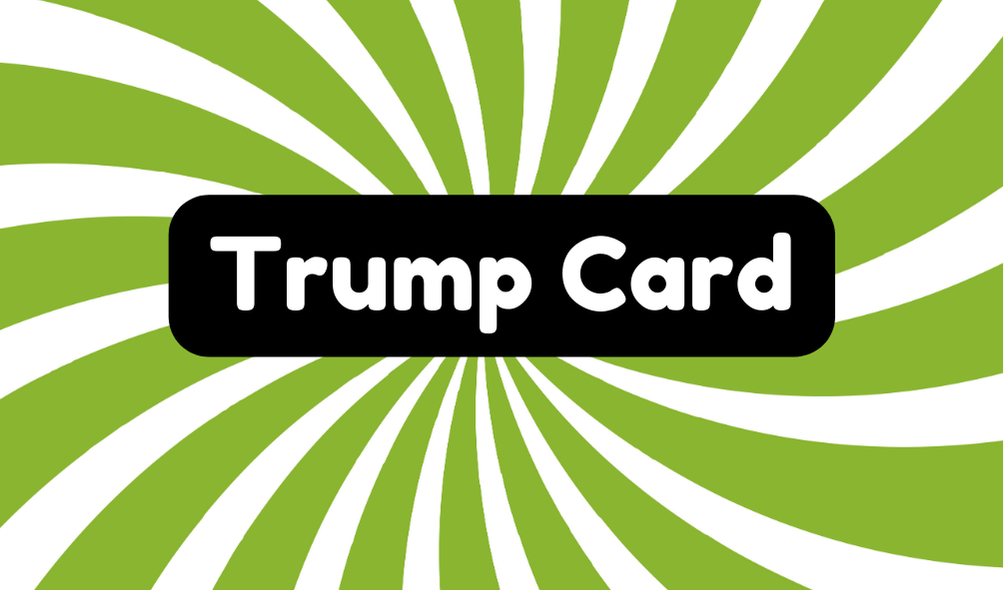The term "trump card" signifies a strategic advantage that can decisively influence outcomes, originating from a 15th-century Italian card game where a trump card could defeat opponents. Over time, its meaning evolved to symbolize hidden resources or tactical leverage in various contexts, including business and politics. For example, a lawyer's surprise witness might serve as a trump card in a trial. Today, the concept remains relevant, prompting scrutiny about when and how these advantages are deployed. Understanding the implications tied to timing and authenticity is vital, suggesting there's more to uncover about this intriguing term.
Synonyms
In discussions of strategic advantages, various synonyms for "trump card" reflect nuances in meaning and context. These terms help clarify the concept of hidden advantages and strategic leverage. It is essential to recognize how these alternatives contribute to understanding the broader implications of having a decisive factor in competitive scenarios.
- Ace in the hole: A hidden advantage that can be revealed at a critical moment.
- Silver bullet: A solution that effectively resolves a significant challenge.
- Ace up one's sleeve: Secret options or resources that are reserved for emergencies.
- Winning hand: The strongest set of advantages in any situation.
Understanding these synonyms provides insights into tactical decision-making and the need for strategic planning across various fields, from business to personal interactions.
Example of Sentences
Illustrative examples effectively demonstrate the diverse applications of the term "trump card" across various contexts. Understanding its usage can clarify how individuals leverage strategic advantages in different fields. Here are some key sentences:
- The lawyer revealed a surprise witness, a true trump card, crucially altering the trial's dynamics.
- The startup's new partnership served as a strategic advantage, attracting essential investor interest and competitive leverage.
- The candidate's compelling final speech acted as an unexpected trump card, impacting the election's outcome.
- The coach's decision to play a seasoned athlete became the trump card that clinched victory for the team.
Each instance illustrates how a well-timed move can provide considerable benefits in competitive situations, echoing the importance of strategic thinking.
Origin
The term "trump card" traces its roots to the fifteenth-century Italian card game known as trionfi, where the concept of a trump card originated. In these card games, a trump card held historical significance, serving as a powerful tool to outplay opponents by defeating their cards. As the popularity of card games spread across Europe, the term began to evolve, illustrating strategic advantage beyond gaming. By the 19th century, "trump card" had shifted into a metaphor for any decisive factor in business negotiations and competitive situations. Understanding this evolution reveals not only the game's significance but also a critical view of how language adapts, reflecting our need for strategic leverage in an ever-changing world.
Collocations
Strategic collocations are essential for effectively conveying the nuanced meaning of "trump card" across various contexts. Using precise terms can enhance understanding and highlight the concept's multifaceted nature. Here are some relevant collocations:
- Strategic advantage: Leveraging a trump card to outmaneuver competitors.
- Hidden resource: Identifying underutilized assets that can pivot an outcome.
- Decisive factor: Recognizing moments when a trump card influences decisions.
- Competitive edge: Utilizing unexpected strengths to secure victories.
While the allure of a trump card suggests guaranteed success, understanding its nuances is critical. Often, how one wields this hidden resource distinguishes strategic thinkers from mere opportunists. Consequently, discerning context and timing is crucial to effectively harnessing this concept.
How to Use in Everyday Language
Understanding how to incorporate the term "trump card" into everyday language can enhance communication and convey nuanced meanings effectively. This phrase signifies a strategic advantage or a hidden resource, often employed when one party seeks a competitive edge in various situations. For instance, you might say, "The team's innovative strategy served as their trump card during the competition," or, "She revealed her trump card by negotiating a unique contract." Using this term can convey a sense of careful preparation and tactical thinking. However, in casual conversation, be mindful of its implications; not every advantage is ethical. Ultimately, leveraging "trump card" correctly can enrich discussions, signaling to others that you understand the importance of strategy and timing in decision-making.
Why Is It Still Relevant Today?
How does the concept of a "trump card" maintain its significance in today's fast-paced world? In an era characterized by rapid change and fierce competition, organizations and individuals increasingly rely on strategic advantages to thrive. A trump card represents a hidden resource or strategy, granting competitive leverage when it matters most. Whether in business transactions, political arenas, or personal interactions, wielding a trump card can redirect outcomes dramatically. Nevertheless, this reliance raises questions about authenticity and sustainability. Are we sacrificing transparency for short-term gains? While trump cards can lead to success, their effectiveness often depends on contextual factors, making their role both essential and precarious. Ultimately, understanding when and how to deploy these strategies is key to maneuvering contemporary challenges.







